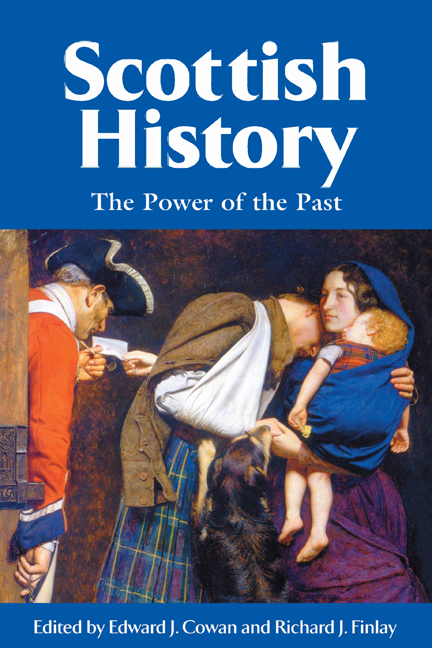Book contents
- Frontmatter
- Contents
- Contributors
- Introduction
- 1 The Picts‘ Place in the Kingship's Past Before John of Fordun
- 2 The Demonisation of King John
- 3 Late Medieval Scotland and the Matter of Britain
- 4 In Search of the Scottish Reformation
- 5 Civil Society and the Celts: Hector Boece, George Buchanan and the Ancient Scottish Past
- 6 The Covenanting Tradition in Scottish History
- 7 ‘What's in a Name?’: Pedigree and Propaganda in Seventeenth-Century Scotland
- 8 The Ideological Uses of the Picts, 1707-c.1990
- 9 The Jacobite Cult
- 10 Queen Victoria and the Cult of Scottish Monarchy
- 11 ‘Their Laurels Wither'd, and their Name Forgot’: Women and the Scottish Radical Tradition
- 12 Tomorrow's Ancestors: Nationalism, Identity and History
- Index
4 - In Search of the Scottish Reformation
Published online by Cambridge University Press: 24 September 2020
- Frontmatter
- Contents
- Contributors
- Introduction
- 1 The Picts‘ Place in the Kingship's Past Before John of Fordun
- 2 The Demonisation of King John
- 3 Late Medieval Scotland and the Matter of Britain
- 4 In Search of the Scottish Reformation
- 5 Civil Society and the Celts: Hector Boece, George Buchanan and the Ancient Scottish Past
- 6 The Covenanting Tradition in Scottish History
- 7 ‘What's in a Name?’: Pedigree and Propaganda in Seventeenth-Century Scotland
- 8 The Ideological Uses of the Picts, 1707-c.1990
- 9 The Jacobite Cult
- 10 Queen Victoria and the Cult of Scottish Monarchy
- 11 ‘Their Laurels Wither'd, and their Name Forgot’: Women and the Scottish Radical Tradition
- 12 Tomorrow's Ancestors: Nationalism, Identity and History
- Index
Summary
The standing of the Scottish Reformation has undergone considerable change in the course of the past generation. As late as its quatercentenary in 1960, the professor of Church History in the University of Glasgow was still able to claim with confidence that the Reformation had produced a church which was a ‘national symbol’ and that ‘one may doubt whether there could be a Scotland without it’. In the Scottish diaspora, in places such as small-town Canada or New Zealand, where John Knox and Andrew Melville churches, replicating faithfully stages of the schisms and reunions within the nineteenth-century church, this is probably still the prevailing view. One of the most influential works ever to come out of that diaspora claimed that:
Scotland and Presbyterianism seem to have been made for each other. Even to this day, when the old dogmatisms have softened and sometimes all but evaporated, a thoroughbred Scots who for one reason or another is not a Presbyterian tends to feel somewhat ill at ease about it, even a little embarrassed, almost as might an American who preferred cricket to baseball or an Englishman who liked Cervantes better than Shakespeare.
Within Scotland itself, however, such moral certainties now seem outdated. An article by a conservative columnist in The Scotsman,during the meeting of the General Assembly in May 1999, argued that the ‘Church of Scotland may still be the established national church but it is no longer the church of the nation.’ The fact that the General Assembly then met in another place, supplanted by the new Scottish parliament, which is what now represents the Scottish nation, exaggerated still further the dislocation of the two of the key elements of Scottish identity - a Protestant church for a Protestant people. The same piece pointed to a severe drop in attendance over the past generation: the Church of Scotland had been losing members ‘almost as fast as the Scottish Conservative and Unionist Party has lost voters’. Although it had 680,000 communicant members, ‘only 17 per cent of Scotland's adult population are now members of the Kirk’.
- Type
- Chapter
- Information
- Scottish HistoryThe Power of the Past, pp. 73 - 94Publisher: Edinburgh University PressPrint publication year: 2020



